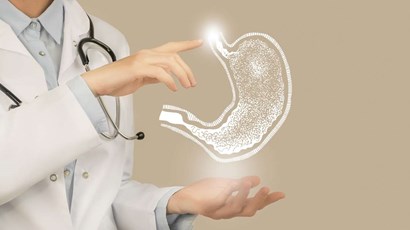Weight Gain
Weight gain is rarely caused by simply eating more, or being less active, it is often more complicated than this. There are many possible causes of weight gain, and often a number of factors play a part. These may be social, cultural, societal, psychological or medical.
What causes weight gain?
Most simply, it might be due to taking in more calories through food and drink than your body needs, or not expending enough energy to use it up. However, other factors can also cause weight gain, including eating the wrong types of food, certain medical conditions or medications, genetics, stress, lack of sleep and age.
In certain circumstances weight gain is appropriate and needed. Various causes of weight gain are discussed below in further detail.
Eating too much
Different people have different calorie requirements to keep their weight at the same level. A 20-year-old male athlete, for example, will need to eat more than an inactive older person.
Men and women have different calorie requirements but it also varies by age, ethnicity, activity levels and other differences between individuals. However, regularly eating more calories than your body uses each day will usually, over time, lead to weight gain.
Broadly speaking, adults need between 2,000 and 2,500 kilocalories (kcal) per day, ~2,000 kcal for women and ~2,500 kcal for men, to be moderately active and maintain their weight at a stable level. Both food and drink (see below) contribute to the daily calorie intake.
As a rough rule of thumb, equal amounts of vegetables, lean protein (fish, non-fatty meat, eggs, tofu, etc.) and carbohydrate should be served when portioning meals. This means that each of these food groups would make up one third of the serving plate.
Whereas when trying to lose weight, aim to serve half a plate of vegetables, a quarter of a plate of lean protein and a quarter of a plate of starchy carbohydrates instead.
Eating the wrong things
The quality of what is eaten is as important as the quantity consumed. A large plate of steamed broccoli does not provide the same number of calories as a large plate of cake!
Experts remain divided about whether fat or sugar is the biggest cause of weight gain, but the sensible option is a balanced diet with limited amounts of both sugar and fat. Processed and ultra-processed foods (UPFs) should also be avoided where possible. A processed food is one that has been altered from its original form, usually with added industrial substances and additives to artificially enhance the flavour. Excessive consumption of UPFs has linked to the development of obesity and significantly raises the future risk of type 2 diabetes, heart attacks and strokes.
See the separate leaflet called Healthy Eating.
Alcohol and other drinks
Drinking alcohol regularly adds significantly to your calorie intake. For example, there are approximately:
- 159 kcal in a medium 175 ml glass of 13% wine.
- 182 kcal in a pint of 4% lager or beer.
- 244 kcal in a pint of 5% lager or beer.
- 216 kcal in a pint of 4.5% cider.
- 89 kcal in a flute (125 ml) of champagne.
- 50-60 kcal in a single unit of a 40% spirit (plus any calories in the mixer).
So alcohol can be a cause of weight gain, and reducing or stopping what you drink may be one way of reducing weight gain. However, alcohol is not the only drink that can contribute to your daily calorie intake. Soft drinks and fruit juices can also contain calories you didn't realise you were taking in owing to the sugar content. For example, there are approximately:
- 139 kcal in a 330 ml can of Coke®.
- 135 kcal in a 330 ml can of Pepsi®.
- 55-80 kcal in a 150 ml glass of orange juice.
- 134 kcal in a 250 ml Innocent® strawberry and banana smoothie.
Not exercising enough
Sedentary lifestyles are thought to be a contributing factor to the increasing problem of obesity in the developed world. Regular exercise has many physical and mental health benefits and is a factor in maintaining weight.
Public Health England advises a minimum of 150 minutes of physical activity each week, in bouts of 10 minutes or more. 30 minutes of exercise five times per week would meet this requirement. This helps to reduce blood sugar and therefore protect against gaining excessive weight. For more information, see the separate leaflet Physical Activity for Health.
Medical conditions causing weight gain
Some medical conditions make it more likely that you will gain weight. These include:
- Conditions which make you less mobile. Anything which means you can't exercise regularly will make it more likely that you will gain weight. For example, if:
- You are in a wheelchair due to disability, illness or injury.
- You have pain during exercise - for example, from osteoarthritis.
- If you become breathless when you exercise - for example, due to heart failure or chronic obstructive pulmonary disease (COPD).
- Having an underactive thyroid gland (hypothyroidism).
- Cushing's syndrome.
- Polycystic ovary syndrome.
- Fluid retention.
By treating the condition and/or adapting what you eat accordingly, a healthy weight can still be maintained in the presence of the above-described medical conditions.
Side-effect of a medication
Some medicines may cause weight gain as a side-effect. In some cases it may be possible to swap to another medicine if weight gain results. Some medicines which can cause weight gain include:
- Antidepressants. Any antidepressant can cause weight gain, but some are more likely to do so than others, such as sertraline, amitriptyline, mirtazapine and paroxetine.
- Steroids.
- Antipsychotic medicines for conditions such as schizophrenia.
- Lithium, sometimes used as a mood-stabilising medicine.
- Some of the treatments used to manage diabetes. (Some common medicines for diabetes are more likely to cause weight loss however).
- Some of the treatments used to manage epilepsy.
Although weight gain is sometimes thought to be a side-effect of the combined oral contraceptive (COC) pill and hormone replacement therapy (HRT), there is no evidence for this effect.
Age
The number of calories the body needs reduces as we get older - this may be partly due to a drop in level of activity and amount of muscle.
Menopause
Weight distribution often changes at menopause in women, due to hormonal changes, causing more fat to settle around the tummy area.
Genetics
Being overweight tends to run in families. Some of this may be due to a shared lifestyle, but inherited genes do play a part in weight gain. No single gene is solely responsible. Certain ethnic groups are at higher risk of developing obesity; eg, in 2021, 72% of UK adults from black ethnic groups were overweight or obese compared to 63.5% of the general adult population. South Asian adults, particularly women, are prone to gaining weight in the tummy area (central obesity) in middle age and this population has higher weight-related risk of disease, for example a greater risk of developing type 2 diabetes or high blood pressure, at a lower body mass index (BMI).
There are also a small number of rare genetic conditions associated with weight gain starting in childhood, for example Prader-Willi syndrome.
Lack of sleep
There is some evidence that tiredness and not getting enough sleep can result in weight gain. Less time spent sleeping increases the hormone ghrelin which results in increased appetite, and reduces leptin leading to a reduced sensation of fullness.
Stress and lifestyle factors
Lifestyle factors can have a bearing on weight. For example, boredom or worries can lead to 'comfort eating'. We eat for many reasons other than hunger. The stress hormone, cortisol, regulates metabolism. High levels of cortisol can increase appetite, resulting in weight gain. However, stress can also cause some others to lose weight.
Certain jobs which involve eating and drinking (bar work, corporate hospitality) might have an effect, as might changing from a job which involves walking around all day to one which involves sitting in an office chair all day.
Social lives may involve eating and drinking, and if you associate with people who eat a lot, or eat out a lot, or drink a lot of alcohol, you may find yourself drawn into the same habits.
Sometimes people who are giving up smoking put on weight as they may replace their cigarette with a snack and consequently eat more.
Appropriate weight gain
At certain times, weight gain can be needed by your body, or can be appropriate. For example:
- If you are pregnant. (See also the separate leaflet called Diet and Lifestyle during Pregnancy.)
- To maintain a normal BMI eg, if you are recovering from a severe illness or anorexia.
- Athletes wishing to increase muscle in training.
- As children and teenagers grow.
Ready to hit your weight loss goals?
Find a range of services to suit you, from medication through to managed programs
Why does weight gain matter?
Up to a certain point, it doesn't. However if you gain too much weight and your BMI goes above 30, it can cause damage to your health. You can read about the ways in which your health can be damaged in the separate leaflet called Obesity and Overweight.
What can be done about weight gain?
If you are still within a healthy weight range, then you don't need to do anything other than keep an eye on your weight. A healthy weight range refers to a BMI between 18.5 and 25 for most people. However, this range is lower for most non-white ethnicities, given that individuals from these backgrounds are at higher risk of the problems associated with weight gain such as type 2 diabetes and heart disease.
Within the healthy weight range, a lot of worry about weight and weight gain is fuelled by the media, social media, and (often photo-shopped) pictures of people with 'perfect bodies'. Much of this isn't necessarily realistic or healthy and can be very damaging to your physical and mental health.
Being healthy is far more important to your happiness than having that perfect flat stomach - and people often don't realise that until they are not in good health, or someone close to them is not in good health.
However, if your weight gain is taking you out of a healthy weight range then you do need to try to take action in the interests of maintaining good health and being well. Read the separate leaflet called Weight Loss (Weight Reduction) for information about how to address weight gain in a healthy and sensible way. You also need to be mentally ready and prepared to lose weight. When you reach this stage, seek support from a GP in your practice or a practice nurse who should be able to sensitively discuss your options further.
Gut health and weight gain
A number of studies suggest that weight gain may be related to the germs in our guts. We all have many millions of germs (microbes - bacteria, fungi, protozoa, viruses, etc) which live inside our guts all the time.
It seems that the balance of these can affect how much food we absorb, and therefore possibly the amount of weight we put on in relation to the calories we eat. For example, some gut microbes may produce hormones involved in appetite regulation. The balance may be changed by diet, using probiotics and prebiotics, or by medical means, which may help people lose weight. Eating a variety of unprocessed foods containing fibre, fruit, vegetables, pulses and grains is thought to help improve the gut microbiome.
Further reading and references
UK physical activity guidelines; Dept of Health
Dietary Requirements; British Nutrition Foundation
Davis CD; The Gut Microbiome and Its Role in Obesity. Nutr Today. 2016 Jul-Aug51(4):167-174. doi: 10.1097/NT.0000000000000167.
Ells LJ, Demaio A, Farpour-Lambert N; Diet, genes, and obesity. BMJ. 2018 Jan 10360:k7.
Caleyachetty R, Barber TM, Mohammed NI, et al; Ethnicity-specific BMI cutoffs for obesity based on type 2 diabetes risk in England: a population-based cohort study. Lancet Diabetes Endocrinol. 2021 Jul9(7):419-426. doi: 10.1016/S2213-8587(21)00088-7. Epub 2021 May 11.
Aoun A, Darwish F, Hamod N; The Influence of the Gut Microbiome on Obesity in Adults and the Role of Probiotics, Prebiotics, and Synbiotics for Weight Loss. Prev Nutr Food Sci. 2020 Jun 3025(2):113-123. doi: 10.3746/pnf.2020.25.2.113.
Andersen MM, Laurberg T, Bjerregaard AL, et al; The association between sleep duration and detailed measures of obesity: A cross sectional analysis in the ADDITION-PRO study. Obes Sci Pract. 2022 Oct 219(3):226-234. doi: 10.1002/osp4.640. eCollection 2023 Jun.
Durrer Schutz D, Busetto L, Dicker D, et al; European Practical and Patient-Centred Guidelines for Adult Obesity Management in Primary Care. Obes Facts. 201912(1):40-66. doi: 10.1159/000496183. Epub 2019 Jan 23.
Obesity; NICE CKS, September 2022 (UK access only)



